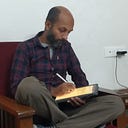Watching
I like quick results. I love it when things happen exactly when I want it the way I want it. I have set up my surroundings in a way that I can be effective, highly productive so that I can get things done.
That's when my son wants to learn a new guitar chord. Or my daughter appears, explaining something she's been upto in all the eloquence of a three year old. This interruption messes with my productivity set up and makes me less efficient. As a result I get irritated. I grit my teeth. Then I get worked up about all the things that I had planned to ‘’get done”.
And then I realise this is an “I”-centred set up. “I” is what’s important. “I” am not tuned to the needs of others. Hardly do “I” notice when someone is implicitly suggesting that they need help or love or care. I miss out on those relationship nuances. I feel lonely and messed up.
Marilyn McEntyre, in her 'Word by Word’, narrates the importance of ‘watching’ in our relationships and daily lives. She writes of Maria Montessori who observed children for hours, watching them play or engage with their surroundings. She later developed theories of early childhood education and became the founder of the Montessori system of child education.
Through watching children for hours, she discovered that when left to themselves without undue judgement, restraint or even praise, children educate and empower themselves through repeated engagement with their surroundings. As a result she developed a respect for children's intelligence, curiosity and sensitivity, realising in the process how society tends to underestimate children's wholeness, innate wisdom and dignity.
In the light of these insights, McEntyre reflects and shares with us something worth pondering:
"Her philosophy of teaching is rooted in that respect. Montessori teachers are trained to watch and notice and assist the children in the work for which they're ready.
If we watched another that way a little more often, we might see when someone needs permission to slow down and take a breath, when someone needs a word of encouragement she's hesitant to ask for, when it would lift someone's spirits just to be noticed. We might become more imaginative in our responses to those we're so used to seeing that we may be missing what's there to see."
So my children and their voices and play time become more visible to me. My students and their hopes, dreams and anxieties become apparent and almost tangible to me. Life opens up a new, broad window, a new presence to which I cannot help but respond. Watching and responding imaginatively are slowly becoming a crucial part of my formation, my identity, my personhood. And I continue to watch.
How about you?
Mathews George
